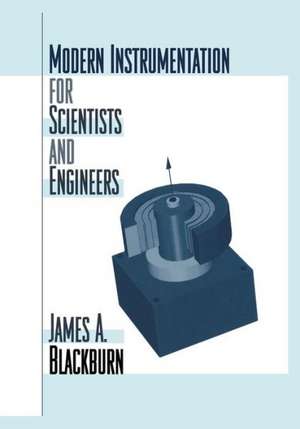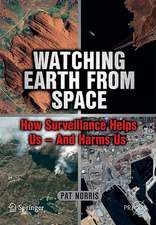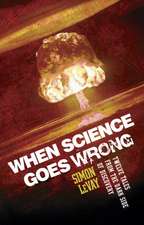Modern Instrumentation for Scientists and Engineers
Autor James A. Blackburnen Limba Engleză Paperback – 7 sep 2012
| Toate formatele și edițiile | Preț | Express |
|---|---|---|
| Paperback (1) | 395.25 lei 43-57 zile | |
| Springer – 7 sep 2012 | 395.25 lei 43-57 zile | |
| Hardback (1) | 652.17 lei 43-57 zile | |
| Springer – 20 noi 2000 | 652.17 lei 43-57 zile |
Preț: 395.25 lei
Nou
Puncte Express: 593
Preț estimativ în valută:
75.63€ • 79.16$ • 62.95£
75.63€ • 79.16$ • 62.95£
Carte tipărită la comandă
Livrare economică 31 martie-14 aprilie
Preluare comenzi: 021 569.72.76
Specificații
ISBN-13: 9781461265122
ISBN-10: 1461265126
Pagini: 336
Ilustrații: XV, 319 p.
Dimensiuni: 178 x 254 x 18 mm
Greutate: 0.59 kg
Ediția:Softcover reprint of the original 1st ed. 2001
Editura: Springer
Colecția Springer
Locul publicării:New York, NY, United States
ISBN-10: 1461265126
Pagini: 336
Ilustrații: XV, 319 p.
Dimensiuni: 178 x 254 x 18 mm
Greutate: 0.59 kg
Ediția:Softcover reprint of the original 1st ed. 2001
Editura: Springer
Colecția Springer
Locul publicării:New York, NY, United States
Public țintă
Professional/practitionerDescriere
Knowledge of instrumentation is for experimentalists a kind of fluency in the language of measurement. But it is a fluency not so commonly possessed, and without which much of the experimental process remains hidden and mysterious. The basic goal in writing this book is to provide a treatment of useful depth of the basic elements of the instrumentation "language," namely electronics, sensors, and measurement. The present epoch is arguably a golden age for instrumentation. The crucial ingredient has been the exceptional development of semiconductor fabrication technology, and this has led to the present richness in both analog and digital inte grated circuits. The former provide relatively inexpensive but high-performance electronic modules (such as the operational amplifier) which can serve as build ing blocks for more complex circuits, whereas the latter have culminated in the desktop computer, which has permeated modem life generally and revolu tionized the instrumentation world with its capacity to act as a measurement controller and data storage center. Finally, silicon micromachining is creating a host of new sensors for such quantities as acceleration and pressure.
Cuprins
I Electronic.- 1 Physical Quantities.- 1.1 Charge, Potential, and Current.- 1.2 Magnetic Field.- 1.3 Capacitance and Inductance.- 2 DC Circuits.- 2.1 Branch and Node Analysis.- 2.2 Loop Analysis.- 2.3 Remarks.- Problems.- 3 AC Circuits.- 3.1 Alternating Voltage and Current.- 3.2 Resistors as AC Components.- 3.3 Capacitors as AC Components.- 3.4 Inductors as AC Components.- 3.5 Impedance.- Problems.- 4 Bridge Circuits.- 4.1 DC Bridges.- 4.2 AC Bridges.- Problems.- 5 Amplifiers.- 5.1 Noninverting Amplifier.- 5.2 Inverting Amplifier.- 5.3 Difference Amplifier.- 5.4 Summing Amplifier.- 5.5 Frequency Response.- Problems.- 6 Special-Purpose Circuits.- 6.1 Unity-Gain Buffer.- 6.2 Instrumentation Amplifier.- 6.3 Log and Antilog Amplifiers.- 6.4 Constant Current Source.- 6.5 Voltage and Current Conversion.- 6.6 Analog Integration and Differentiation.- Problems.- 7 Waveform Generators.- 7.1 Oscillators.- 7.2 Pulse Generators.- 7.3 Crystal Oscillators.- 7.4 Remarks.- Problems.- 8 Filters.- 8.1 Passive Filters.- 8.2 Active Filters.- 8.3 Remarks.- Problems.- II Sensors.- 9 Temperature.- 9.1 Therm istors.- 9.2 Resistance Temperature Detectors.- 9.3 Thermocouples.- 9.4 Temperature-Sensitive Diodes.- Problems.- 10 Light.- 10.1 Photoconductive Sensors.- 10.2 Photodiodes.- Problems.- 11 Magnetic Fields.- 11.1 Hall-EffectSensors.- 11.2 Fluxgate Magnetometers.- 11.3 Comparative Performance.- 12 Strain.- 12.1 Strain.- 12.2 Resistive Strain Gages.- Problems.- 13 Pressure.- 13.1 Piezoresistive Gages.- 13.2 Piezoelectric Gages.- 14 Displacement and Rotation.- 14.1 Displacement.- 14.2 Rotation.- 15 Acceleration.- 15.1 Micromachined Sensors.- 15.2 Piezoelectric Sensors.- III Measurements.- 16 DC Measurements.- 16.1 Introduction.- 16.2 Digital-to-Analog Conversion.- 16.3 Voltage Measurement.- 16.4 Current Measurement.- 16.5 Resistance Measurement.- Problems.- 17 AC Measurements.- 17.1 Estimated RMS.- 17.2 True RMS.- Problems.- 18 Data Acquisition.- 18.1 Sample and Hold.- 18.2 Sampled Waveforms.- 18.3 Multichannel Systems.- 18.4 PC-Based Data Acquisition.- Problems.- 19 Data Acquisition Systems.- 19.1 GPIB Bus.- 19.2 GPIB for the User.- 19.3 VXI.- 19.4 PXI.
Recenzii
From the reviews:
"The author has managed to succeed in writing a ‘small encyclopedia of modern instrumentation’ in the size of a textbook with 320 pages … There is a vast spectrum of scientific knowledge and engineering technology included in this book … It is a very good textbook or a reference source for a continuing education seminary and for courses to nonelectronics graduates." IEEE Instrumentation and Measurement
"The author has managed to succeed in writing a ‘small encyclopedia of modern instrumentation’ in the size of a textbook with 320 pages … There is a vast spectrum of scientific knowledge and engineering technology included in this book … It is a very good textbook or a reference source for a continuing education seminary and for courses to nonelectronics graduates." IEEE Instrumentation and Measurement
Caracteristici
Includes supplementary material: sn.pub/extras








